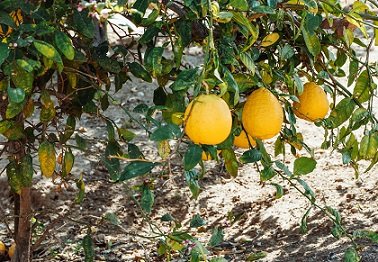For people growing fruiting trees, deer are a serious threat that leads to tree damage and lower fruit output.
Deer can eat lemon tree foliage when desperate. Also, besides eating the leaves they can cause damage using their antlers.
Do Deer Eat Lemon Tree Leaves?
Deer are usually a common garden or farm pest when you live in areas where they naturally reside. These large pests are not subtle and they can be extremely damaging to young plants and even unestablished lemon trees.
But, do deer eat lemon tree leaves?
Well, deer like to steer clear of plants with pungent smells and tastes. Lemon leaves do have a distinct taste and aroma. Generally this wards off deer in most cases. However, there is no telling what a desperate deer may eat!
In desperate times, deer may turn to eat lemon tree foliage. But, besides eating the lemon tree foliage, there are other ways a deer can harm your lemon tree!
Some bucks may use your lemon tree as a post to sharpen their antlers! This, of course, would severely damage the lemon tree. Perhaps it can even ruin any hopes for an impressive lemon harvest if the tree has undergone that much damage.
How to Keep Deer Away From My Lemon Tree?
People who have spotted deer in their garden all have a common question. How can I keep deer away from my lemon tree? Well, there are a few ways to go about protecting your lemon trees from deer. Here are a few of them.
- Fencing
The first way to keep your lemon trees safe is the most common one. By putting up a barrier between your lemon trees and the deer! Fencing the area can also go a long way in protecting your lemon trees against a host of other pests.
The fence will have to be quite high and widely surrounding your lemon trees as deer can jump. Also, these animals are very tall when they stand on their hind legs!
- Use Deer Deterrent Plants
Deer are not too fond of aromatic plants. This particularly applies to herbs and spices. Planting these around your lemon trees can make all the difference. The smell alone will keep them away.
But, even if the deer are very desperate, they will attack the herbs before making it to your lemon tree. This puts some distance between the pests and your trees. So, you can have some peace of mind by planting herbs/spices near your lemon trees.
- Soap Bars
As crazy as it may sound, putting soap bars around your lemon trees can deter pests. Also aligning with aromatic substances that dispel deer, scented soaps are not something deer-like! The advantage here is that soap has a human-like scent that scares off deer.
Use soap bars to your advantage if you can’t afford to fence off the area. String them and hang them up on the branches of your lemon tree.
Another variation of a natural deterrent is spraying a hot sauce solution on the lemon tree’s leaves.
11 Red Evergreen Shrubs to Grow in the USA for Colorful Gardens
Tips for Lemon Growers in Deer Prone Areas
If you are dead set on growing lemons despite the risk of deer, you’ll need a few tips. Follow these points to make sure your trees grow big and produce healthy lemons.
Tip 1 – Dwarf Lemon Trees for Pots
The words ‘lemon trees’ probably create an image of a tall and towering tree with many branches extending outwards. However, this is not the only image a lemon tree can portray. You can choose to get a lemon shrub.
Believe it or not but they can be planted in a pot. Thus making it a pot plant. Do you know what the best thing about a pot plant is? They are mobile and can be moved around quite a bit.
That means that you can bring them in at night when deer are most active! Additionally, you can bring the lemon tree pot indoors during winter.
And if you really want to, you can keep the pot indoors forever! Indoors is the safest place provided you can meet the tree’s requirements.
Tip 2 – Avoid Thornless Hybrids
Lemon tree variants that are purebred and lack crossed genes will have thorns! Guess what these thorns are for? They are there to protect the lemon tree from any pests that may want to eat the foliage.
Thorns are an evolutionary measure evolved by lemon trees to defend themselves against pests like deer. But, common purebred lemon trees existing today are a result of genetic modifications aimed at removing thorns altogether.
Why would anyone want a lemon tree lacking thorns?
Well, to be honest, lemon tree thorns are a nuisance for people who are growing just one or two lemon trees.
Pruning and harvesting lemons can be troublesome! Getting pricked is not pleasant plus there are chances of infection through the prick wound.
But, despite these drawbacks, thorns may just be the defense your lemon trees need against deer!
Get all the facts about thorns with Do lemon trees have thorns?
Tip 3 – Build a Fortress Around Your Lemon Tree
You can stop deer from eating your lemon tree foliage by putting up a barrier. Using PVC piping you can create a collar around the tree’s trunk.
This helps to restrict access to the lemon tree’s foliage. It creates a distance between your lemon tree and the deer. You can use a range of materials to create a barrier and protect your lemons from more than just deer.
Tip 4 – Protect Lemon Tree Saplings
Lemon trees are very vulnerable when young. This is also a time when pests may find them increasingly alluring. You can grow your lemon tree sapling in an enclosed area and then bring it out when it is more likely to survive.
Bring the lemon tree indoors, plant them in an enclosed greenhouse, or anywhere where the deer can’t get to it. If young lemon trees are attacked by deer early on it will hinder their growth and they may not even survive.
Also, besides poor growth, they may exhibit poor fruit and fruit production.
Conclusion
Protecting your lemon trees is essential if you want them to make it past the sapling stage and produce lemons.
Deer will eat lemon tree leaves when food is scarce and they cannot find anything else to eat. Even though lemon trees are not a deer’s favorite food, it may even choose to use them as a scratching post to sharpen its antlers.
Both of the above activities can damage your lemon tree and ruin any chances of a healthy lemon harvest.
Have a lemon tree that is lacking in nutrients and minerals? Find out what is the best fertilizer for lemon tree.
FAQs
How do I protect my lemon tree from animals?
You can protect your lemon tree from animals by covering it with a netting or mesh-like material. Alternatively, you can build structures around it to keep out animals.
Do deer like eating lemon trees?
Deer don’t prefer to eat lemon tree foliage. But they will eat it in times of desperation or can even choose to damage your lemon tree by using it to sharpen their antlers.

